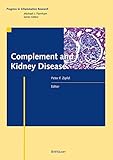Complement and Kidney Disease / edited by Peter F. Zipfel.
Tipo de material: TextoSeries Progress in Inflammation ResearchEditor: Basel : Birkhäuser Basel, 2006Descripción: xvI, 236 páginas 32 ilustraciones, 4 en color recurso en líneaTipo de contenido:
TextoSeries Progress in Inflammation ResearchEditor: Basel : Birkhäuser Basel, 2006Descripción: xvI, 236 páginas 32 ilustraciones, 4 en color recurso en líneaTipo de contenido: - texto
- computadora
- recurso en línea
- 9783764374280
- QR180-189.5
Springer eBooks
The complement system in renal diseases -- Complement in renal transplantation -- C1q and the glomerulonephritides: therapeutic approaches for the treatment of complement-mediated kidney diseases -- Complement deficient mice as model systems for kidney diseases -- Non-Shiga toxin-associated hemolytic uremic syndrome -- Role of complement and Factor H in hemolytic uremic syndrome -- Genetic testing in atypical HUS and the role of membrane cofactor protein (MCP; CD46) and Factor I -- Towards a new classification of hemolytic uremic syndrome -- Therapeutic strategies for atypical and recurrent hemolytic uremic syndromes (HUS) -- Complement defects in children which result in kidney diseases: diagnosis and therapy -- The role of complement in membranoproliferative glomerulonephritis -- The experience of a patient advocacy group.
It is evident that a defective or deregulated complement system results in kidney diseases. An important role of complement effector and regulatory proteins in pathological settings of the kidney has been demonstrated. A large panel of distinct human kidney diseases is caused by defective complement control. Genetic analyses have identified mutations in complement regulators that are associated with these diseases. Mutations have been identified in the fluid phase alternative pathway regulator Factor H and the membrane regulator Membrane Cofactor Protein MCP (CD46). The functional characterization of the mutant proteins allows to define the pathophysiological events on a molecular level. These new concepts and data on disease mechanisms allowed establishing new diagnostic and promising therapeutic approaches for several human kidney diseases. Molecular biology, clinics and therapy are discussed in this volume.
Para consulta fuera de la UANL se requiere clave de acceso remoto.


